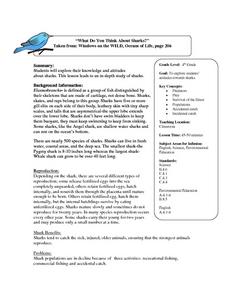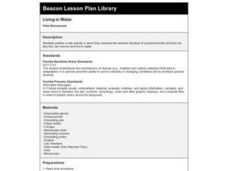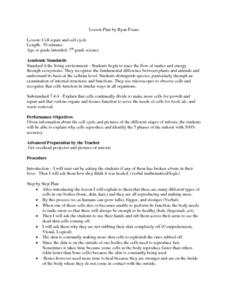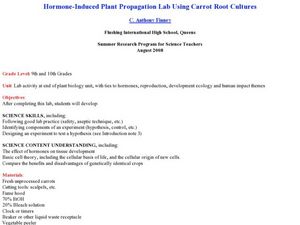Curated OER
How Sweat Glands Cool Your Body
Students use water and rubbing alcohol to explain how sweat cools mammals' bodies. They write their findings in a journal. After a lecture/demo, students perform a simple experiment that demonstrates this phenomenae.
Curated OER
Regional Differences
Students examine how the brain sends and receives messages by assessing PET scans. They diagram areas of the brain that evaluate various situations. They discover that individuality is due to different responsesnin the brain.
Curated OER
What Do You Think About Sharks?
Fourth graders explore sharks. They read a story about sharks and act out using Reader's Theater. They discuss fact and attitude statements about sharks and complete a Shark Survey. They create a shark promotion brochure informing...
Curated OER
What Does Your "Homunculus" Look Like?
Students determine the density of touch receptors in various parts of the body on the right hand side. They use collected data to draw a picture of the
"homunculus" of an experimental subject.
Curated OER
Animal Classification
Students classify animals. In this animal classification lesson, students identify characteristics from each of the 5 categories of vertebrates. Students group animals by categories.
Curated OER
Mitosis
Seventh graders describe the stages of mitosis. In this biology activity, 7th graders explain the importance of cell division. They complete an activity packet at the end of the activity.
Curated OER
Making Sense of Things: The Human Body and Senses
Students conduct an experiment to evaluate the accuracy of their senses.
Curated OER
Insulation and Buoyancy
Students predict whether their hands be warmer in ice water with or without a blubber mitten. They construct a blubber mitten using plastic, Crisco and compare their results with a control group. They observe how this affects buoyancy too.
Curated OER
Anthrax Attacks
Young scholars develop an understanding about the disease Anthrax, how it is transmitted, and its effects on the body. By the end of the lesson, students have gained the knowledge that bacterial diseases may invade and damage different...
Curated OER
Investigation 4 - Dinosaurs Tracks
Fourth graders make inferences and interpretations from sets of dinosaur tracks. They describe Utah fossils and how they were formed. Partners trade their sketches of tracks and try to guess which dinosaur it belonged to.
Curated OER
Living in Water
Fourth graders perform a lab activity in which they examine the external structure of a preserved fish and find out why fish can survive and live in water. They perform a lab which is guided by a worksheet imbedded in this plan.
Curated OER
Bioethics And Fetal Tissue Research
High schoolers are introduced to the topic of fetal tissue implantation. In groups, they examine a case study and share information with the rest of the class. Then they do a reflective writing assignment to assess understanding of the...
Curated OER
Immune System Function
Students study the different facets of the Human immune system, including the functions of all the different organs in the immune system.
Curated OER
Prosthetic Design
High schoolers research characteristics of different body parts. Students design and sketch a prosthetic they developed. They share their idea with the class and complete a worksheet.
Curated OER
Cell Repair and Cell Cycle
Seventh graders explore the cell cycle. They view pictures of different stages of mitosis and explain why cells reproduce. They identify the five phases of mitosis: interphase, prophase, metaphase, anaphase, and telophase.
Curated OER
What's the Matter with My Orange?
Students use oranges to informally explore decomposition, dehydration, fermentation, the water cycle, bacteria, yeast, food webs, the needs of living things, and physical vs. chemical change over a period of three or more months.
Curated OER
Lymphatic and Immunity
In this biology activity, students identify and locate various vocabulary terms related to the lymphatic and immunity systems of the body. There are 42 biology terms located in the word search.
Curated OER
The Great American Alligator
In this alligator activity, students read a short essay describing the natural history of this reptile. Then students complete 3 fill in the blank and 3 short answer questions.
Curated OER
Reptile Crossword
In this crossword puzzle worksheet, students read the clues and complete the crossword puzzle with vocabulary about reptiles. Students complete 17 clues.
Curated OER
Cells Acrostic Poem
In this cells poem worksheet, students write an acrostic poem about cells. Students use the letters CELLS to begin each line of poetry that tells something about cells.
Curated OER
Marine Animal Life Cycles
Fourth graders identify the life cycle of a crab and other marine animals. In this marine life lesson plan, 4th graders complete a crab puppet activity, explore crab moulting, research the life cycle stages of a crab, and identify crab...
Curated OER
Harmful Algal Blooms in Full Bloom
High schoolers calculate the total percentage of samples from the data on the graphs. In this marine science lesson, students analyze the concentration levels over a period of time. They suggest ways to lessen the effect of these blooms.
Curated OER
Hormone-Induced Plant Propagation Lab using Carrot Root Cultures
Students evaluate the importance of hormones in living things. In this biology lesson, students experiment on carrots to differentiate how humans and plants reproduce. They collect data from experiment to answer analysis questions.
Curated OER
Mechanisms to Fight Disease
Young scholars explain how our body fight diseases. In this biology lesson, students identify the role of bacteria and viruses in human illness. They create a PowerPoint presentation and essay at the of the unit.
Other popular searches
- Skinny Bones
- Human Biology Skin
- Skin Cancer
- B.f. Skinner
- Healthy Skin
- Skinny Bones Book Review
- Skin Care
- The Skin
- Buffalo Skins
- Skin Anatomy
- Skin Safety
- Skinny Bones Novel Unit

























